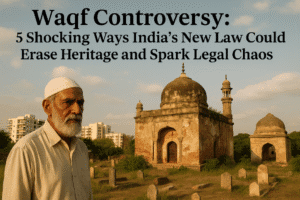Waqf Controversy: 5 Shocking Ways India’s New Law Could Erase Heritage and Spark Legal Chaos
India’s centuries-old tradition of waqf—properties donated by Muslims for religious, educational, or charitable use—has become a battleground over heritage, identity, and land rights. Thousands of these assets, from mosques to orphanages, are mired in disputes rooted in colonial-era record-keeping gaps, post-Partition migration, and decades of bureaucratic neglect.
The recent Waqf Amendment Act 2025, introduced by Prime Minister Narendra Modi’s government, has intensified tensions by abolishing the “waqf by user” provision—a legal safeguard recognizing properties as charitable assets based on historical community use, even without formal deeds. Critics argue this erases protections for over 400,000 such properties, risking the erasure of Islamic cultural legacy.
Disputes range from Delhi’s 123 contested heritage sites to Karnataka farmlands suddenly claimed by waqf boards, pitting oral traditions against modern land laws. While supporters claim the law curbs corruption and false claims, opponents view it as a broader marginalization of Muslim rights, sparking protests and Supreme Court challenges. At stake is not just land, but India’s pluralistic history and the delicate balance between preserving heritage and ensuring equitable governance.

Waqf Controversy: 5 Shocking Ways India’s New Law Could Erase Heritage and Spark Legal Chaos
For centuries, Islamic communities in India have sustained a tradition of donating land and property for religious, educational, and charitable purposes—a practice known as waqf. These assets, ranging from mosques and graveyards to schools and hospitals, are managed by state-appointed waqf boards. But today, thousands of these properties, collectively worth billions, are entangled in legal chaos. A contentious new law, the Waqf Amendment Act 2025, has ignited fierce debates over minority rights, cultural preservation, and land ownership in a nation where history and modernity often collide.
Roots of the Crisis: History Meets Neglect
Waqf disputes are not new. Their origins trace back to British colonial rule, when ambiguous land records and oral declarations of donations sowed seeds of confusion. Post-1947 partition exacerbated the issue, as Muslim families fleeing to Pakistan left behind properties later claimed by new occupants or government bodies. In Punjab alone, over half of the 75,965 waqf properties are encroached, a legacy of migration and disputed inheritance.
The problem is compounded by systemic neglect. In Delhi, the waqf board’s list of managed properties mysteriously shrank from 1,964 in 2008 to 1,047 in 2024, with no clarity on the missing 917 sites. Graveyards once under its care dwindled from 562 to fewer than 80. “Many properties slipped through the cracks because boards failed to maintain oversight,” explains journalist Afroz Alam Sahil, who uncovered discrepancies through Right to Information requests.
The New Law: Reform or Power Grab?
The Waqf Amendment Act 2025, introduced by Prime Minister Narendra Modi’s government, aims to resolve decades-old disputes by overhauling governance. Key changes include abolishing the “waqf by user” provision, which historically recognized properties as charitable assets based on long-standing community use—even without formal deeds. Critics argue this erases protections for thousands of sites, particularly those donated orally centuries ago.
“Once a waqf, always a waqf” was a legal principle upheld by India’s Supreme Court in 1998. But the new law upends this, potentially stripping status from an estimated 402,000 properties classified as “waqf by user.” Syed Zafar Mahmood, a former bureaucrat, warns, “Tens of thousands of assets could vanish overnight, erasing a vital part of India’s Islamic heritage.”
Supporters counter that the law curbs abuse. Waqf boards, often accused of arbitrary claims, have declared ownership over 5,973 government properties, including schools and offices. “Unchecked power led to corruption and false assertions,” says a government spokesperson, citing cases where farmers in Karnataka or villagers in Kerala faced sudden claims on lands they’d occupied for generations.
Human Stories: Graveyards, Farms, and Bureaucratic Wars
In Delhi, 123 waqf properties—mosques, tombs, and shrines—are caught in a tug-of-war between the Delhi Waqf Board and federal agencies. One such site is the historic Mehrauli mosque, now surrounded by luxury apartments. Its caretaker, Abdul Qadir, laments, “They say we have no papers, but our ancestors maintained this place for 300 years. How do you document faith?”
In Karnataka, a 200-acre plot donated in the 1800s for a Muslim orphanage became a flashpoint when the waqf board claimed it in 2021, despite local Hindu farmers tilling the land for decades. Legal battles like these highlight the clash between oral tradition and modern land titling.
Broader Implications: Identity and Politics
The law’s critics see it as part of a broader pattern of marginalizing Muslims, who comprise 14% of India’s population. “This isn’t just about land—it’s about erasing our legacy,” says Asma Khan, a community organizer in Hyderabad. Protests have erupted in states like Kerala and Tamil Nadu, where waqf properties often serve marginalized groups.
Yet, proponents argue reform is necessary. Mohd Ismail Khan, a lawyer, notes, “Even under the old law, boards lost cases due to poor documentation. Streamlining could protect genuine assets.” The government promises digitized records and stricter oversight to curb land mafias exploiting legal loopholes.
What Next? Courts and Communities Weigh In
With Supreme Court hearings underway, the future of India’s waqf properties hangs in the balance. Petitioners demand reinstating the “waqf by user” clause, fearing its removal could spark a wave of litigation. Meanwhile, historians urge a middle ground: “These sites are living history,” says Prof Mohammad Reyaz. “Losing them would impoverish India’s cultural tapestry.”
As the debate rages, one truth emerges: The struggle over waqf is more than a legal battle—it’s a fight to reconcile India’s pluralistic past with its contested present. Whether through revised laws or renewed dialogue, the path forward must balance heritage preservation with justice for all stakeholders.
You must be logged in to post a comment.